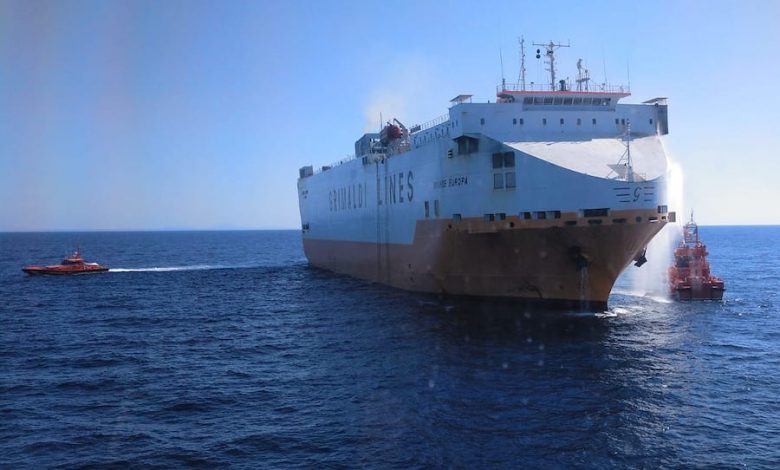After two fires on roros in two months, Grimaldi calls for controls on car batteries

On the back of two fires in a short amount of time on a pair of its ships, Italy’s Grimaldi Group has called for more stringent controls and regulations for cars being transported and for dangerous goods shipped in containers.
A fire broke out on Grimladi’s Grande Europa roro earlier this month 25 miles from Palma de Mallorca in the Mediterranean. Two months prior to this blaze, the company suffered another fire on the Grande America roro, a ship that eventually sank in the Bay of Biscay.
“Following the umpteenth case of a fire that broke out on vehicles transported by cargo vessels, the Grimaldi Group launches an appeal to introduce more stringent controls and regulations on cargo sea transport, not only for rolling units but also for containers,” the Naples-based group said in a statement.
“Notably, with reference to rolling freight, the Grimaldi Group requests that there be more controls on car batteries, which often cause short-circuits on board vessels, as well as in port terminals. Moreover, it calls for the total prohibition of the presence of personal effects in second-hand vehicles, embarked on ro/ro vessels.
“Finally, with regard to containers, the International Maritime Organization is urged to make mandatory the certification by a classification society of the correct stuffing of containers carrying dangerous goods.”
Last month class society ABS and representatives from the Cargo Incident Notification System (CINS) formed a joint industry project to develop best practices for carriage of dangerous goods.
CINS is a shipping line initiative, whose aim is to increase safety in the supply chain, reduce the number of cargo incidents onboard ships and highlight the risks caused by certain cargoes and/or packing failures. CINS’s membership comprises over 80% of the world’s container slot capacity.
The number of severe fires onboard boxships caused by the incorrect carriage of dangerous goods has spiked in recent years with the Maersk Honam and Yantian Express being two high profile examples of a worrying growing trend for liner shipping.
Insurer TT Club is pushing for greater scrutiny of dangerous goods carriage onboard boxships, warning that there is now a major containership fire at sea on average every 60 days.
TT Club’s records indicate that across the intermodal spectrum as a whole, 66% of incidents related to cargo damage can be attributed to poor practice in the overall packing process; that is not just in securing but also in cargo identification, declaration, documentation and effective data transfer. The calculated cost of these claims in the marine, aviation and transport insurance sector is in excess of $500m a year.
ICHCA International, the cargo handling operatives association, has calculated that of the 60m packed containers moved each year, 10% or 6m are declared as dangerous goods. Information from published government inspections – which are invariably biased towards declared dangerous goods loads – suggests that 20% of these are poorly packed or incorrectly identified. This translates into 1.3m potentially unstable dangerous goods containers travelling around the world each year.

Surely the control of car batteries and the additional cargo that is loaded inside passenger vehicles is the responsibility and remit of Grimaldi, as a carrier?
Why is Grimaldi calling for more regulation when their own shipment rules almost certainly already specify that batteries must be disconnected, that petrol tanks must be drained and that nothing is to be loaded inside the cars and vehicles that are shipped.
If Grimaldi do not already have these shipment rules in their booking conditions and Contract of Carriage then I would be surprised (as my previous employers worked that way). If the booking conditions make those statements, restrictions and limitations then all they need to do is enforce them, either directly or with the stevedores.
As for container cargoes, this certainly needs more work and I would suggest that the only way to manage the IMO containers is to have them stuffed under the watchful eye of the Line’s representative or by employing authorised inspector/ surveyors to observe and certify safe loading. For any mis-declaration or non-declaration of cargo there should be the real prospect of enormous fines when caught.
We don’t expect to carry hazardous materials on aeroplanes so why should we tolerate inaccuracies on merchant ships?